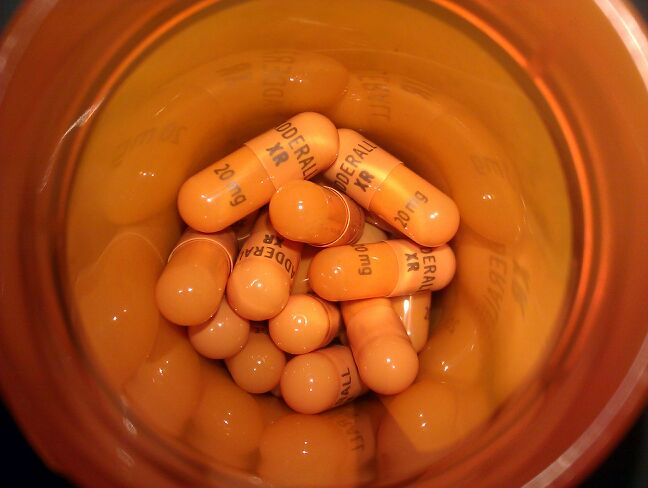It’s a Tuesday night in early December, tomorrow is the second to last day of the term.
It’s not that you didn’t plan for your finals, it’s just that maybe a couple of your projects took longer than expected. And now here you are, in the 24-hour study lab, hastily cramming material into your brain like clothes into a suitcase.
With a paper to finish, another one to begin and two exams to study for, pulling an all-nighter is pretty much mandatory. How to stay awake and focused becomes the name of the game. Most college students already have something of a tolerance to caffeine, meaning many graduate from coffee to Adderall at some point.
Do you blame them? With the pressures that exist on college students to succeed, a pill that can keep you on task for six hours at a time sounds like a miracle.
However, the benefits of cramming with Adderall are vastly overstated, and in the long run you’re probably better off without it. Here are five reasons why I quit doing Adderall to study.
1. Cramming Doesn’t Work
A recent study found that up to 99 percent of university students have admitted to cramming before important tests, and almost 3 of 4 subjects believed studying last minute to be the most effective method of study.
However, the opposite is in fact true. For 90 percent of study participants, spacing out time to learn proved to be more effective than cramming.
Not only that, but paced learning actually helps reinforce the information in your memory, ensuring that your mind retains it for more than a few days/hours. It’s a crazy thought, but you might actually need to know what your studying someday as a professional.
“But being able to recognize something isn’t the same as being able to recall it.” – Tom Stafford
Remember that suitcase analogy? It’s actually a lot like a suitcase; as you only use a suitcase temporarily, so you only remember crammed material temporarily.
Leaving everything to the last minute feels like the easier way to go. I mean who really wants to plan time to write final papers and start projects weeks or even months in advance?
But your grades are (90 percent) likely to suffer because of it. Higher education is meant to challenge what you’re capable of, not what you’re capable of with a performance enhancer.
None of this is even to mention the fact that if you stay up all night before a test, you’re likely to be strung out and exhausted when it’s time to actually perform. How likely do you think your grades are to suffer then?
2. It Limits Creativity
Creative thinking is an essential part of earning good grades in a lot of subjects. Even outside of the arts and humanities, creative critical thinking is used to draw connections between seemingly unrelated material, it helps make your work original.
The whole point of taking Adderall is to focus and accomplish as much as possible, to organize your tasks and thoughts and take them on in a linear fashion.
And while a degree of concentration is obviously necessary to accomplish anything, the high level of focus provided by Addy is not conducive to more creative thought processing.
Linear thinking does not allow your brain to make the random connections between seemingly unrelated material that lead to originality.
This may not matter if you’re studying your notes for a Calc exam. But when it comes to writing papers or presentations, your work may stand to lose a lot.
3. High Risk of Abuse
Most people aren’t fiends for Adderall, but if you’re feeling that you need it just to stay caught up and on track, you may need to reduce some of your daily obligations.
Many of us (myself included) have the tendency to be overly confident in how many balls we can juggle at once. Before we know it, we’re taking 17 credits, working 30 hours a week, have an internship, are taking dance lessons and have joined a book club.
Adderall is becoming more popular amongst the current generation, but how much good does it really do? You’ll often be too tired to do your best at anything. Worse, you probably won’t be enjoying any of the extracurricular activities you were once interested in anyway.
Ultimately, take life at your own pace. Your own, slow and natural pace. 9 credits? Great. 20 hours at work? Great. Being a terrible dancer? Priceless. Don’t take drugs just to stay caught up with yourself, create a life that doesn’t require you to struggle.
4. Alternatives
The best alternative to Adderall is not anything you eat or drink. The best alternative to Adderall is in fact planning. And not just planning, but being realistic about how much time each assignment will take to accomplish.
Try this: About a month before finals, create a to-do list. Put all of your projects, presentations, papers and tests on the list.
Next, prioritize this list based on their point value, size and difficulty of each task.
Then, plan time throughout each week that you can sit down and focus on one assignment at a time. If you plan time during the day, you won’t even need coffee or to stay up late.
Finally, execute. Stick to your plan as if it were your job. If you get behind schedule, factor that in and adjust your plan accordingly.
Even if you do wind up doing a little cramming (because who isn’t going to study extra hard the night before an exam?), you can cram secure in the knowledge that the rest of your major assignments are already complete. This security relieves stress and frees up mental capacities for the tasks at hand.
When you study notes, try transcribing them in a new and neat fashion.
5. Reversal
There’s something to be said for the benefit of active procrastination. Delaying the start of a paper so that you can socialize your ideas and allow them to simmer is a great way to know what direction that paper will go before you actually start.
It’s important, with this more than anything, to be realistic with yourself about how long it will take you to complete the procrastinated assignment. Reasonable time constraints can have the effect of kicking your brain into a higher gear.
That said, Rome wasn’t built in a day.














